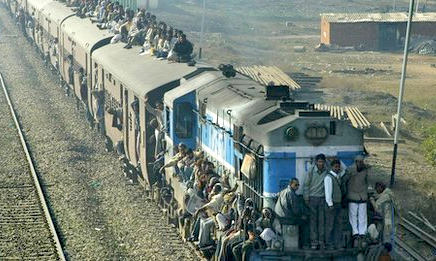New Delhi, Jun 22: Amid protests over a sharp hike in fares and criticism of political parties, the government on Saturday strongly defended the increase in passenger fares, including for short-distance travel, arguing the revision was long overdue as the last hike took place around 11 years ago and a heavy subsidy burden was "unsustainable" in the wake of soaring costs.
 While passengers travelling by sub-urban and short-haul trains account for 52% of the traffic, their share in total passenger revenues was around 6-7%. This segment accounted for around 60% of the annual subsidy of Rs 26,000 crore, top-ranking officials said, while justifying Friday's fare hike announcement.
While passengers travelling by sub-urban and short-haul trains account for 52% of the traffic, their share in total passenger revenues was around 6-7%. This segment accounted for around 60% of the annual subsidy of Rs 26,000 crore, top-ranking officials said, while justifying Friday's fare hike announcement.
'Fare still includes 50% subsidy on season tickets'
"There is some discomfort among passengers, but an element of rationality has to be brought in as tickets are very low priced. Even after the increase, those travelling on season tickets will pay half the normal fare," Railway Board chairman Arunendra Kumar said. For years, freight traffic has subsidized passenger operations, resulting in companies shifting consignments to road.
Political parties ranging from Congress, Left, Samajwadi Party, BSP to BJP's own allies like Shiv Sena have criticized the increase in passenger fares with cities having well developed suburban networks bearing the brunt. But a day after the hikes were announced, the government did not seem ready to yield ground.
Finance minister Arun Jaitley, who is due to soon present the Modi government's first budget, defended the move to raise tariffs. "The Indian Railways for the last few years have been running at a loss. The only way that railways can survive is when users pay for the facilities that they avail. The passenger services have been subsidized by the freight traffic... A loss making railway will provide below-par services. It will eventually not even have the resources to pay its bill. India must decide whether it wants a world class railway or a ramshackled one. The railway minister has taken a difficult but a correct decision," the minister said in a Facebook post.
The decision to raise passenger fares and freight charges is seen as part of the "bitter medicine" Prime Minister Narendra Modi said was necessary to set right faltering finances that he said were aggravated by UPA's mismanagement of the economy — a charge denied by former finance minister P Chidambaram.
Jaitley's statement came as political parties, including allies such as Shiv Sena, went public with their protest.
But the railways felt it has strong reasons to argue its case. Chairman Arunendra Kumar contended that the fare still included at least 50% subsidy for season tickets, and the actual increase is not significant, although it may look steep in percentage terms.
"It is not a very significant increase, although some people are complaining," DP Pande, member (traffic) in the railway board said, adding that the rise will only partially offset the state-run transporter's loss.
Railways is expected to mop up around Rs 9,200 crore from the Friday's decision to increase passenger fares by 14.2% in all classes while freight charge was hiked by 6.5% with effect from June 25.





Comments
Add new comment